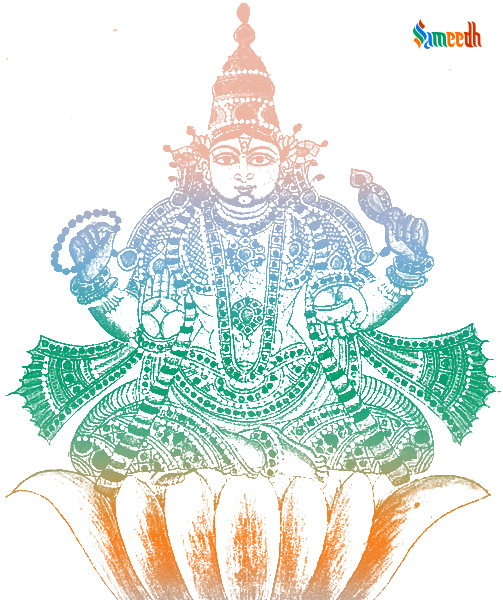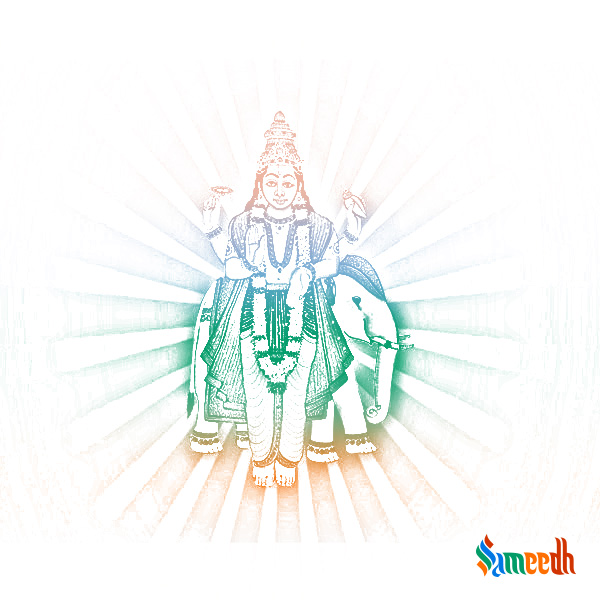Bruhaspati, also popularly known as ‘Devguru’ or ‘Guru’, is the lord of Dharma, wisdom, knowledge and abundance.

Image Source: E. A. Rodrigues
Bruhaspati is the son of Maharishi Angira and mata Surupa. Bruhaspati’s father, Maharishi Angira was one of the 10 manas putras of Brahma Dev hence; he follows the Angira lineage. He is blessed by Devi Saraswati and so, he has deeper knowledge and understanding of the scriptures and the Smritis (religious texts). Therefore, due to his immense wisdom and knowledge, Bruhaspati is regarded as the Guru (teacher) to the Devi and Devtas. Bruhaspati symbolises truth and he is also considered a master of vocabulary.
According to the Indian scriptures, Bruhaspati teaches morals, righteousness, wisdom, imparts all sorts of in-depth knowledge and blesses humankind with abundance. The nature of Devguru Bruhaspati is described in various texts as wise, dutiful, knowledgeable, kind, responsible, noble, dignified, cheerful, optimistic, virtuous and generous. He is the one, who is able to control his anger, i.e. he is able to gain control over his ‘Pashutva’ and retain his ‘Devatva’.
In order to share his knowledge with mankind, Devguru Bruhaspati authored numerous vedic scriptures such as the Bruhaspati Smriti (one of the oldest legal scriptures of ancient India), Dharmashastra (text on law and conduct), Bruhaspati Nitishastra (text on morals and values) and Vastushastra (text containing calculations and formula for civil construction).
Devguru Bruhaspati also created the two knowledge systems namely; the Astik (believers) school of thoughts and the Nastik (non-believers) school of thoughts. He passed the knowledge of the Astik School of thought to the Gods and other great Rishis. The Astik school of thought or Parvigyan or Alaukik relates to today’s metaphysics, whereas; the Nastik School of thoughts is similar to today’s experimental modern science. It is believed that to spread the theory of Nastik School of thoughts, Bruhaspati created 12 forms of himself namely, Loukya Bruhaspati, Dev Guru Bruhaspati, Arthagya Bruhaspati, Satark Bruhaspati, Amokshi Bruhaspati, Kamagya Bruhaspati, Prapanchashil Bruhaspati, Avedik Bruhaspati, Angiras Bruhaspati, Duruha Bruhaspati, Adrista Bruhaspati and Rajadrohi Bruhaspati.
There are some important aspects of the followers of the Astik School of thoughts: the followers believe in the existence of the soul and that the soul is immortal, they firmly believe in the Paramatma (Almighty) and they believe in the concept of reincarnation. The Astik School of thought concerns things that are believed to exist beyond the detection of human senses, whereas; the Alaukik knowledge requires years of devotion and practice to obtain. Both these schools of thoughts are an important part of Indian philosophy.
It is said that Devguru once did penance in Kashi to please Bhagwan Shiv. Seeing his devotion, Bhagwan Shiv was extremely pleased and immediately asked him for a boon. But Bruhaspati was already so blissful to see Bhagwan Shiv standing in front of him that he sang a hymn for Bhagwan Shiv instead of asking for anything. Lord Shiv was immensely pleased with his simplicity and devotion that He conferred Bruhaspati the status of a graha (Planet), one amongst the Navgrahas (nine planets). He is also called the commander of the Navgrahas. Devguru Bruhaspati is not only the largest planet of our solar system but he has also been regarded as the most tender and beneficent planet.

As per vedic astrology, Bruhaspati/Jupiter indicates wealth, fame, devotion, spirituality, philosophy, luck, meditation, ministers, children, fortune, government officials, religion, and charity. He rules planets like the sun and the moon and has control over the movement of the planets. Planets like the Sun, Mars and Moon are its friends whereas; Mercury and Venus are its enemies. He is neutral with Rahu, Ketu and Saturn. Bruhaspati is the owner of the signs Sagittarius and Pisces.
Thus, Bruhaspati as a learned sage and a beneficent planet has been a blessing to humankind.
